Is Stevia Bad For Kidneys?
Chronic kidney disease (CKD) is a serious and life-threatening medical condition. Patients with this condition are often faced with difficult choices when it comes to their diet.
One of the dietary problems they can face is regarding sugar consumption and consideration of alternative sweeteners. One popular option for those looking for an alternative to sugar is stevia. But is it really safe for kidney disease patients to use artificial sweeteners?
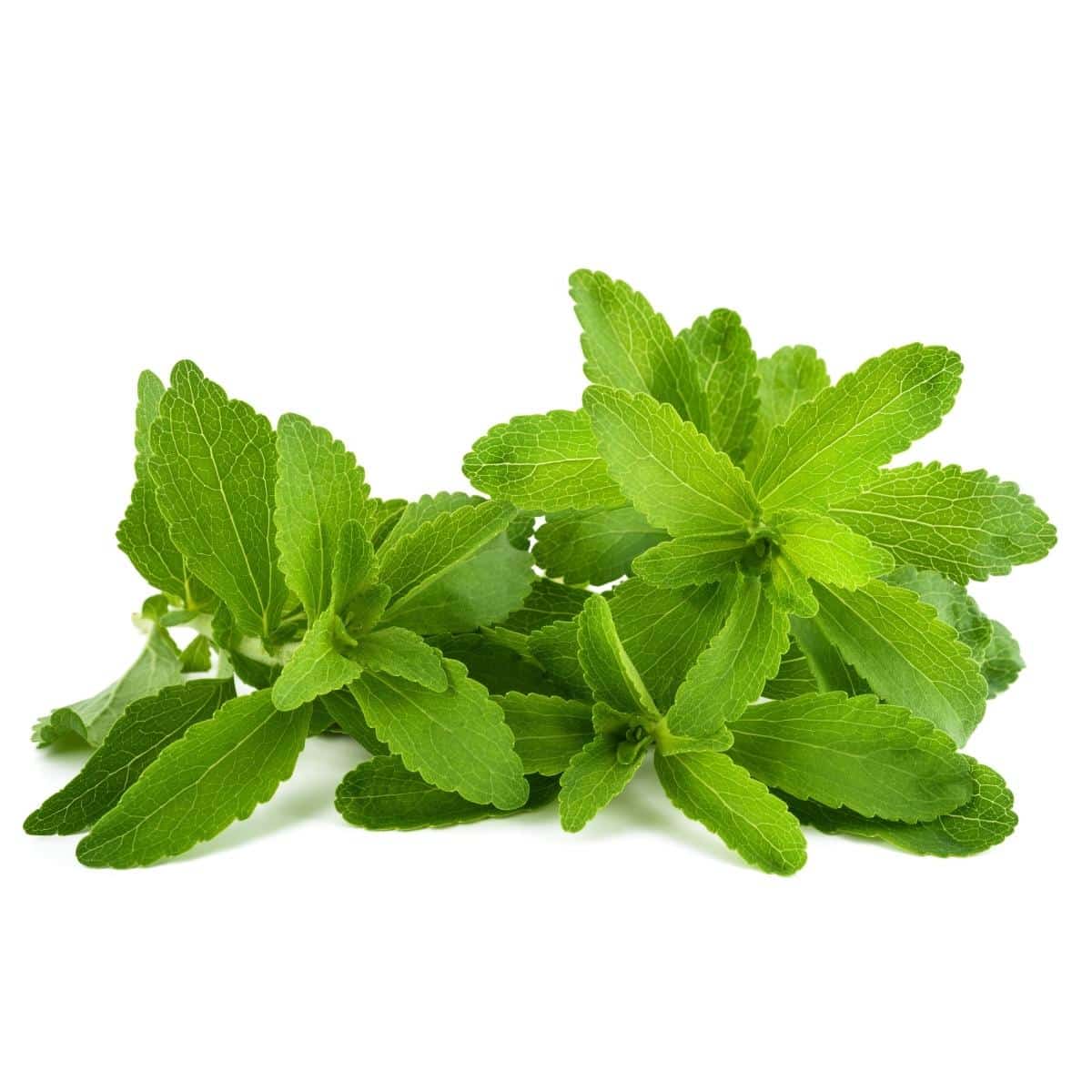
In this article, we'll explore what exactly stevia is and how its consumption could potentially affect those living with chronic kidney disease.
We will also look into the potential pros and cons associated with using stevia as an alternative sweetener and discuss whether it's actually beneficial for people suffering from this medical condition.
So, if you've been considering using stevia as a substitute for sugar in your diet while dealing with kidney disease, then this article is essential reading. Let's dive right in!
Jump to:
- Overview Of Stevia
- Nutritional Value Of Stevia
- Impact On Blood Sugar Levels
- Long-Term Effects On Kidneys
- Potential Benefits For Kidney Disease Patients
- Potential Risks For Kidney Disease Patients
- Is Stevia Better Than Sugar Intake For CKD?
- Frequently Asked Questions
- In Moderation, Stevia May Be Good for CKD
Overview Of Stevia
Stevia is an extraordinary plant, unlike anything else on this planet. The sweet stevia leaf been used for centuries as a natural sugar substitute, and its power to reduce cravings has made it famous across the globe.
This remarkable plant has become so popular that it can be found in health food stores around the world and is used as a food additive in yogurt, cereal bars, and soft drinks. But what does all of this mean for those suffering from kidney disease or diabetes mellitus?
The potential benefits of stevia for kidney disease patients are quite amazing. Studies suggest that compounds in the stevia plant may help improve renal function by reducing inflammation caused by oxidative stress.
In addition, some evidence (a beneficial effect) suggests that stevia may also protect against damage from high blood pressure or cholesterol levels -- both common complications associated with CKD progression.
But before taking any supplement containing stevia, it's important to speak with your doctor about potential risks and side effects.
While generally safe when consumed in moderation, overconsumption of stevia could lead to uncomfortable digestive symptoms such as diarrhea or bloating due to excessive intake of the sweetener’s compounds.
Ultimately, only medical professionals can provide individuals with advice tailored specifically to their own needs and circumstances.
For More Recipes and Ideas --->> Get Your Free Meals and Recipes That Are Perfect for Pre-Dialysis Diets, Pre-Dialysis with Diabetes, or Dialysis Diets.
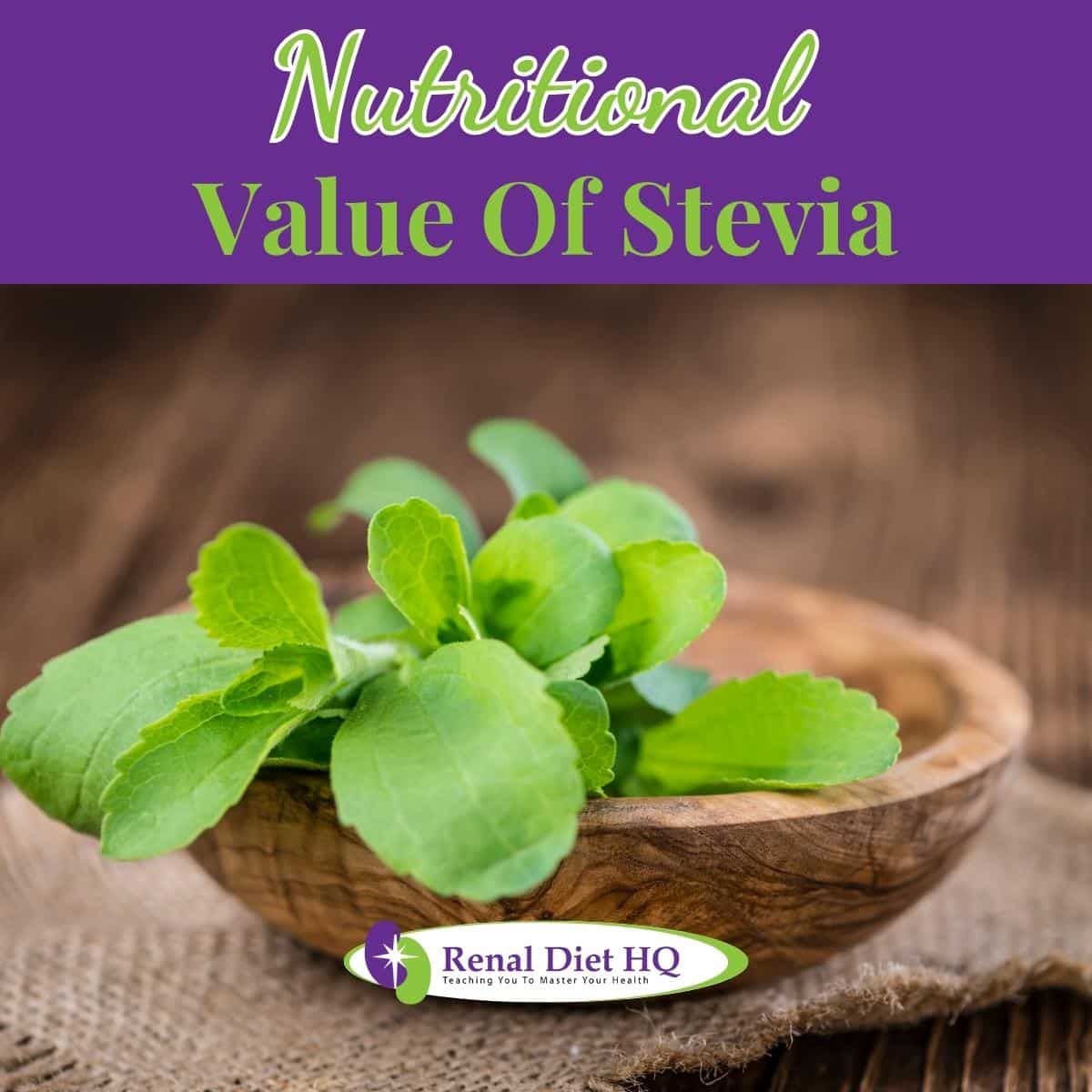
Nutritional Value Of Stevia
Stevia is a natural, low-calorie sweetener that has been used as an alternative to sugar for centuries. It’s made from the leaves of Stevia rebaudiana, which grow in South and Central America. Previous studies have also demonstrated that stevia leaf extracts has some content of water-soluble vitamins such as Vitamin C and Vitamin B complex.
The good news is that stevia does contain compounds called glycosides which have health benefits beyond just sweetness. These compounds are known to help regulate blood sugar levels, reduce inflammation and even act as antioxidants.
In addition, there is some evidence that they could potentially lower cholesterol levels and aid kidney function. Check out this daily low cholesterol diet plan.
For patients with CKD, stevia can offer a safe alternative to traditional sweeteners like sugar or corn syrup - though care should always be taken when consuming anything with potential medicinal properties.
Studies suggest that using moderate amounts of stevia on a daily basis may improve symptoms associated with CKD such as fatigue, weakness and high blood pressure without causing additional harm to the kidneys. However, further studies will need to take place before these claims can be definitively proven true.
Impact On Blood Sugar Levels
It's no secret that people with kidney disease must be extra careful about managing their blood sugar levels especially for those with diabetes. This is because reducing sugar consumption may mean needing to turn to artificial sweeteners. But what does the use of stevia have to do with this?
Could it potentially help or harm those struggling with diabetes and other related conditions to help reduce the elevated serum glucose levels? You can also take a look at this kidney friendly diet for diabetics.
Let's take a closer look.
When consumed, stevia has been found to cause only slight changes in blood glucose and insulin levels compared to other sweeteners like table sugar. In fact, some studies show that consuming it could even improve overall glycemic control over time and reduce the elevated serum glucose level found with regular table sugar.
Additionally, stevia can be used for weight management where it can decrease calorie intake due to its low calorie content and lack of carbohydrates.
However, more research is needed before claiming conclusively that stevia doesn't impact blood sugar levels at all. Some studies have shown that regular consumption may lead to elevated blood glucose concentrations and an increased risk of developing type 2 diabetes over time.
It would thus appear that while occasional intake of stevia is safe, using it regularly should still be done cautiously by individuals who are already prone to hyperglycemia or hypoglycemia.
Overall, the effect of stevia on blood sugar level appears to depend largely on individual factors such as existing health status and amount consumed. Therefore, it’s important for anyone considering incorporating stevia or any other non-caloric sweeteners into their diet – especially those with pre-existing medical conditions – consult with their healthcare provider first.
Long-Term Effects On Kidneys
While it is commonly used as an alternative to sugar, some renal effects are still largely unknown. In this section, we'll explore the long-term effects of stevia on kidneys and whether or not it should be avoided by people with chronic kidney conditions or patients that need to follow a kidney friendly diet for diabetics!
The first thing to consider when examining stevia’s potential impact on kidney health is how much of it is consumed over time. As far as researchers know, consuming small amounts of stevia in moderation does not appear to have any adverse effect on healthy individuals or those with existing kidney issues.
However, large quantities may cause adverse effects or problems due to one of the active compounds found in some forms of stevia: Rebaudioside A (RebA). Studies suggest that high concentrations of RebA can cause bloating, nausea, dizziness, and numbness.
Therefore, if you suffer from kidney disease, you should only consume low doses of pure stevia extract rather than products containing higher concentrations of RebA such as certain types of powdered beverages and processed foods.
It's also important to speak with your doctor before making any dietary changes so they can ensure that what you're taking won't pose an additional risk for developing health complications related to your condition.
Ultimately, while moderate consumption of pure stevia extract appears safe for most people who suffer from mild to moderate kidney disease, caution must still be taken when introducing it into your diet due to the uncertain long-term consequences associated with excessive intake.
Therefore, speaking with a medical professional beforehand is strongly recommended so that whatever decisions are made will take into account both short- and long-term impacts on overall wellness. Keep in mind that you can always take a look at this chronic kidney disease food list.

Potential Benefits For Kidney Disease Patients
Studies have shown that using stevia can help to reduce high blood pressure, which is a common issue amongst those with kidney diseases. Here are some other potential benefits:
- Regulates sugar levels
- Reduces inflammation
- Improves digestion
- Provides vitamins and minerals
- May decrease risk of heart disease
In addition to these impressive health advantages, many people also appreciate the natural sweetness of stevia without added calories or artificial ingredients. As an all-natural alternative to conventional sugar, it appeals to those who want natural health solutions but still crave something sweet.
Not only does it provide a healthier way to satisfy cravings, but consumption could potentially lead to better overall outcomes for those suffering from kidney diseases.
Its potential benefits (over regular table sugar) like blood sugar regulation and reduction of inflammation can be great for diabetic patients, as well as those with cardiovascular diseases.
Stevia has been around since ancient times and its popularity continues today because of the numerous benefits it provides. For patients with kidney disease, this plant-based option can be especially helpful when taken in moderation.
Potential Risks For Kidney Disease Patients
As we have explored the potential benefits for kidney disease patients, it is important to also consider any adverse effects or risks that may be associated with certain treatments.
While stevia has been used as a sweetener for centuries, there are some potential drawbacks of consuming large amounts of this product if you suffer from chronic kidney problems.
| Risk | Description |
| Hypokalemia | Stevia can reduce potassium levels in your blood, leading to hypokalemia which can cause muscle weakness and irregular heart rhythms |
| Dehydration | Drinking products containing stevia could lead to dehydration due to its diuretic properties. This can put an extra strain on kidneys already dealing with excess fluid retention. |
| Low Blood Pressure | High doses of stevia may cause very low blood pressure, due to its vasodilatory effects |
| Risk of Hypoglycemia | Stevia can stimulate pancreatic cells that release insulin, which can lower blood glucose levels excessively when taken with other antihyperglycemic medications |
It’s essential that anyone with kidney issues discusses their diet and lifestyle choices with their doctor before beginning any new treatment plan involving stevia. And if you have any questions about the kidney disease diet, talk to a nutritionist or your doctor!
Although it provides many health advantages when taken within recommended limits, excessive consumption could do more harm than good for people who already struggle to maintain healthy renal function.
However, if administered responsibly under medical supervision, it offers valuable relief from common symptoms of kidney-related conditions such as fatigue and high cholesterol levels.
Taking into account all these factors will ensure informed decisions about the best course of action for each individual patient's needs going forward.
Is Stevia Better Than Sugar Intake For CKD?
Stevia has become a popular alternative to sugar as a food additive for those looking for natural sweeteners. But is it better than sugar for people with Chronic Kidney Disease? To answer this question, let's explore the possible benefits and drawbacks of stevia in comparison to traditional sugars.
As far as CKD patients are concerned, one potential benefit of using stevia is that it does not raise blood glucose levels, which can be an issue for some kidney disease patients.
Additionally, it contains no calories or carbohydrates, so it may provide another option if you're trying to limit your intake of these macronutrients. Furthermore, research suggests that certain compounds found in stevia could even help protect against inflammation and oxidative stress - two factors commonly associated with CKD progression.
While stevia use among CKD patients appears safe in moderation and offers several potential benefits compared to regular sugar consumption including lower glycemic response and fewer calories/carbohydrates consumed; more research needs to be done before any definitive conclusions can be drawn regarding its optimal use alongside chronic kidney disease management.
Here’s a summary of potential benefits and drawbacks of stevia in CKD patients:
Benefits:
- No effect on blood glucose levels
- Contains no calories or carbohydrates
- Could potentially reduce inflammation & oxidative stress
Risks:
- May disrupt gut bacteria balance
- Might interfere with hormone regulation
- Products often contain additional ingredients which could exacerbate existing conditions
Although preliminary evidence appears promising for the use of Stevia as a safer alternative to regular sugars amongst CKD patients; further clinical trials will need to be conducted before we can confidently recommend its widespread usage within this population group.
Frequently Asked Questions
How Much Stevia Is Considered Safe For Kidney Disease Patients?
Are you considering using stevia as a sugar substitute if you have kidney disease? It’s important to know how much is safe before adding it to your diet.
To help answer this question, let’s dive into the potential risks and benefits of consuming stevia for those with kidney disease.
No matter what type of health condition you have, it's always best to speak with a healthcare professional about what foods are suitable for your particular situation.
That said, certain studies suggest that small amounts of stevia may be beneficial for people with mild or moderate cases of chronic kidney disease. The main benefit appears to be its ability to reduce blood sugar levels, which can potentially improve metabolic syndrome and other factors associated with poor renal function.
It is recommended a daily intake of up to 4 mg/kg of body weight for the general population. For reference, 1 kilogram is equal to 2.2 pounds.
So, if you weigh 200 pounds that would be about 91kg. (200/2.2). Therefore, a safe daily intake would be 364 mg of steviol glycoside. (4mgX91kg).
Here’s what that calculation looks like: Your weight in pounds divided by 2.2. This gives you your kilograms. Multiply your kilograms by 4 mg and you have your safe daily intake.
Here’s the challenge though: most products do not list the milligrams (mg) of stevia in the product. However, for reference, one packet of Sweetleaf has 40mg of Stevia. Hence, you’d have to consume a lot of it to surpass the recommended daily intake.
Nevertheless, there isn't enough research yet to provide an exact answer on how much stevia someone should consume safely particularly for those living with kidney disease.
In general, experts recommend limiting consumption of all forms of sweeteners - including natural ones like stevia - in order to maintain healthy eating habits. So when it comes down to it, moderation is key!
The debate about stevia's safety for kidney disease patients has been raging for some time now. It may seem like a straightforward question: Is stevia safe for long-term use? But to those aware of its complexities, there is no easy answer.
While studies have found certain benefits of short-term use of stevia in patients with mild kidney damage, there is still not enough evidence regarding long-term effects.
Therefore, caution must be exercised when consuming stevia over extended periods of time and medical advice should be sought before making any decisions about its usage.
Ultimately, the decision lies in the hands of each individual based on their own understanding and needs, while being properly informed and guided by their healthcare team.
It's no secret that sugar substitutes like stevia have become increasingly popular due to their health benefits, but are they really the best option for kidney disease patients?
While stevia may provide certain advantages for people with this condition, it is important to consider the potential side effects and identify other alternatives for food intake changes.
Here is a list of six low-calorie sweeteners as well as non-caloric options derived from natural sources which may be better than artificial sweeteners:
Agave Syrup - This syrup provides sweetness without the need to add any refined sugars. It has a lower Glycemic Index compared with regular table sugar which makes it ideal for those with diabetes and pre-diabetes.
Monk Fruit - Derived from an Asian fruit, this sweetener contains zero calories or carbohydrates making it attractive to health conscious individuals.
Honey – This ancient sweetener contains powerful antioxidants which can aid in reducing inflammation and improving overall health. Plus, its unique flavor makes it a great substitute for sugar! But it is still sugar and does increase blood sugar levels.
Honey Substitute - Instead of using honey, you can opt for a vegan alternative such as maple syrup or date syrup. These products provide natural sweetness while adding only minimal additional calories.
Coconut Sugar – This natural sweetener offers subtle flavors and mild caramel undertones while providing essential minerals like potassium and magnesium.
Xylitol – A sugar alcohol derived from plants such as birch, this product has 40% fewer calories than table sugar while still offering sweetness.
For those looking for an alternative to stevia, these options offer some intriguing possibilities. With further research into each one of them, you'll be sure to find something that works well with your individual needs while still providing delicious sweetness.
The key takeaway here is that there are plenty of viable options available when it comes to choosing an appropriate sugar substitute for kidney disease patients beyond just stevia alone.
So if you're considering switching away from traditional sugars and exploring different alternatives, don’t forget to look into these tasty choices too!
As many of us turn to natural alternatives for our health needs, stevia has become a popular choice.
But before you add it to your daily routine, it's important to understand the potential interactions between stevia and other medications. Some components of the stevia leaf extract such as crude steviosides may have effects on medications such as the following:
1. Stevia can cause further decrease in blood sugar levels when taken with drugs that lower glucose levels.
2. It may decrease absorption of certain antibiotics if taken at the same time.
3. Certain cancer treatments have been shown to be affected by stevia intake.
4. Some chemotherapy drugs interact negatively with high doses of stevia extract.
The risks of stevioside interaction while on medication depends on the type of drug being taken as well as its dosage level. Therefore, anyone considering adding this supplement should speak with their healthcare provider first.
In addition, checking labels carefully for ingredients is also wise since some processed food manufacturers may add some stevia products into certain items which could create further health issues if not monitored closely. You can learn more about how to read labels carefully as a kidney patient.
Ultimately, understanding any possible risks or side effects related to combining stevia will help ensure safe use for all involved.
When it comes to using stevia for Chronic Kidney Disease (CKD) patients, there are special precautions and considerations that must be taken into account. For example, CKD patients should discuss their medical conditions with healthcare providers before consuming any form of stevia so they can decide if the sweetener is safe for them.
It's important to understand the impact of chronic kidney disease on a patient’s overall health when considering whether or not to use stevia.
As such, individuals living with CKD may need to adjust their diet based on factors like electrolyte balance and other metabolic needs in order to stay healthy. Therefore, any dietary changes made due to incorporating stevia should always be discussed with a physician or registered dietitian first.
In addition, those taking medications for managing CKD symptoms should also watch out for potential interactions between stevia and these drugs. While research has shown that stevia is generally considered safe for most people, certain combinations may cause unwanted side effects which could further complicate existing medical issues.
It's best to speak with a doctor about the specific risks associated with combining certain medications and sweeteners like stevia before making any drastic changes in one’s diet.
Stevia has become increasingly popular as an alternative sweetener, but its potential impact on other medical conditions such as hypertension and diabetes is still being debated.
While there have been some studies that suggest stevia may be beneficial for CKD patients, the question remains whether it can help those with other medical issues.
It is important to delve into these conditions as they are risk factors for chronic kidney disease, and if uncontrolled, can lead to very poor health conditions.
There are previous studies that suggest improvement of hypertension and diabetes with the use of stevia. This is important to note of since there is an association between hypertension and chronic kidney disease.
Some research indicates that it may reduce systolic blood pressure levels through vasodilatory effects mediated by inhibition of calcium influx.
This potential reduction in blood pressure may mean less strain on the blood vessels in CKD patients, even in End-Stage Renal Disease Patients. It will be promising of separate studies can confirm that it has benefits in maintaining a normal range of blood pressure. Make sure you check out these end stage renal failure diet recipes.
Other researchers suggest that stevia can help lower blood sugar levels by increasing insulin secretion from pancreatic beta cells. This can be beneficial for diabetic patients. It is yet to be known if the difference in blood glucose levels is significant with its use, especially since this could still be affected by other factors such as sugar intake.
Moreover, there are multiple parameters of blood analysis when it comes to blood sugar control, such as fasting blood glucose, glucose tolerance test, and HbA1c levels, which may show varying results. Therefore, more research needs to be done before any definitive conclusions can be made about its effects on these two conditions.
Ultimately, it’s important to conduct further studies examining this substance so we can get more reliable clinical evidence of how effective it truly is.
Additionally, individuals who wish to use stevia as an alternative sweetener should always consult with their doctor first in order to ensure they remain safe and healthy.
In Moderation, Stevia May Be Good for CKD
In conclusion, it seems that stevia may be considered in CKD patients when used in moderation. Its use should always be discussed with a doctor first. It's also important to keep in mind that every patient is different and may respond differently to stevia depending on their medical condition.
Coupled with sound medical management and lifestyle interventions such as adequate physical activity, adding stevia to the diet has many potential benefits.
For CKD patients, it’s vital to discuss any dietary changes with their healthcare provider before making any drastic modifications.
By doing so, they can ensure that any new additions are well tolerated and beneficial for them both in the short-term and long-term. To sum it up, using stevia instead of sugar can be like hitting two birds with one stone: improving your overall health while still giving you something sweet to enjoy!
Ultimately, if used properly, stevia could be an excellent addition to the diet of those living with chronic kidney disease - not only providing sweetness, but providing potential health benefits as well.


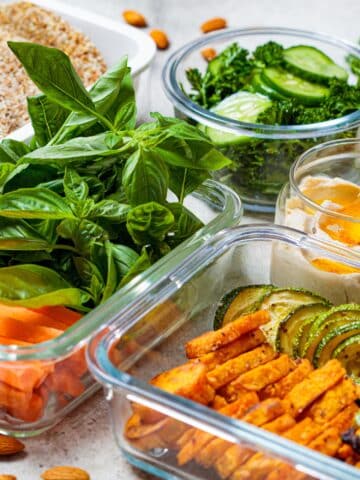



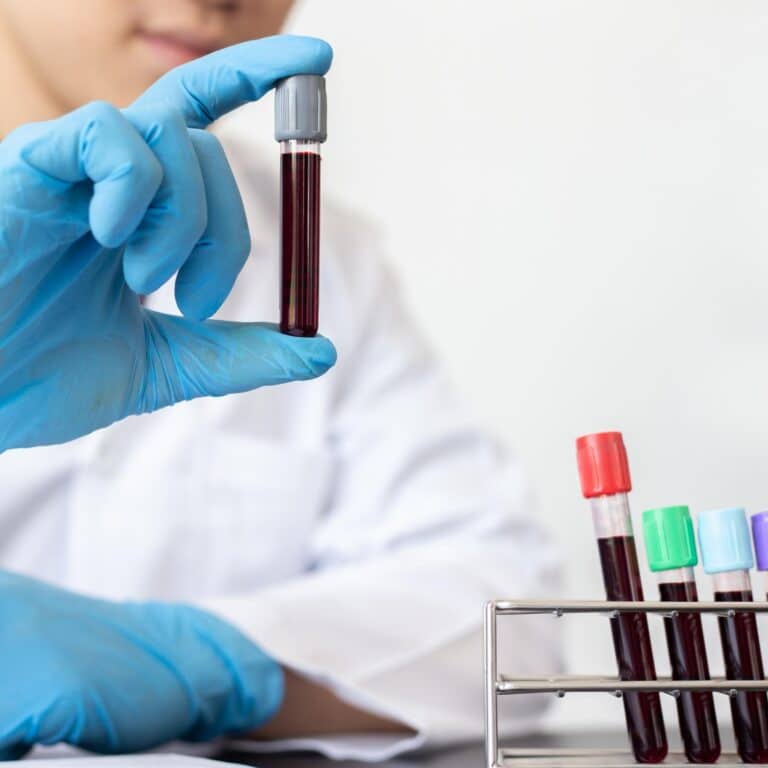
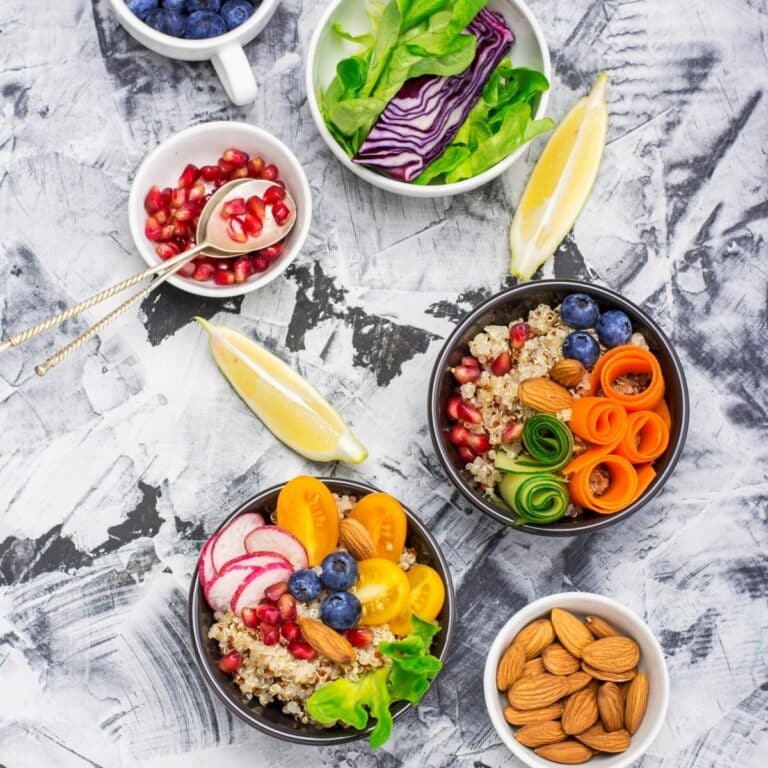
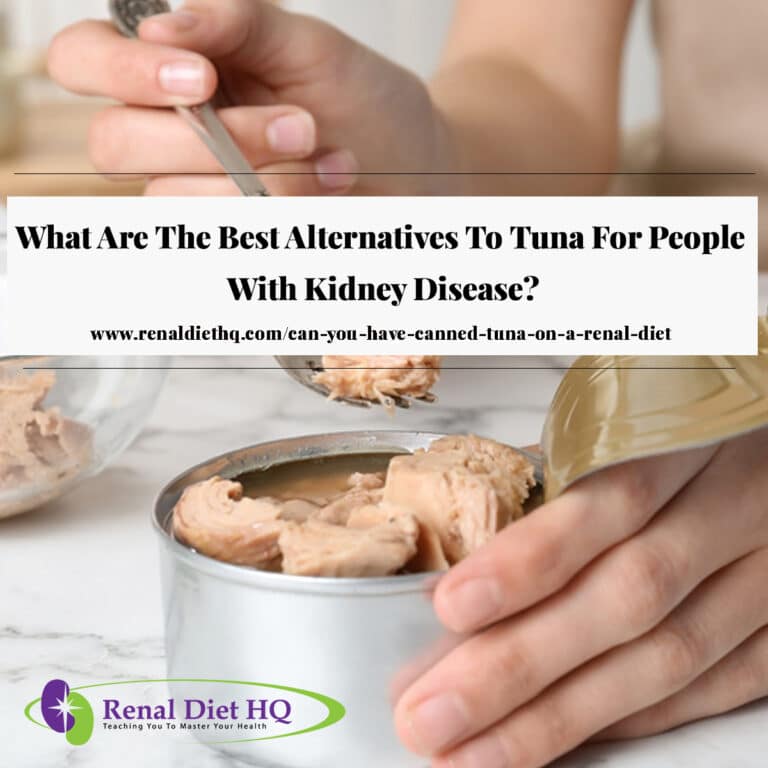
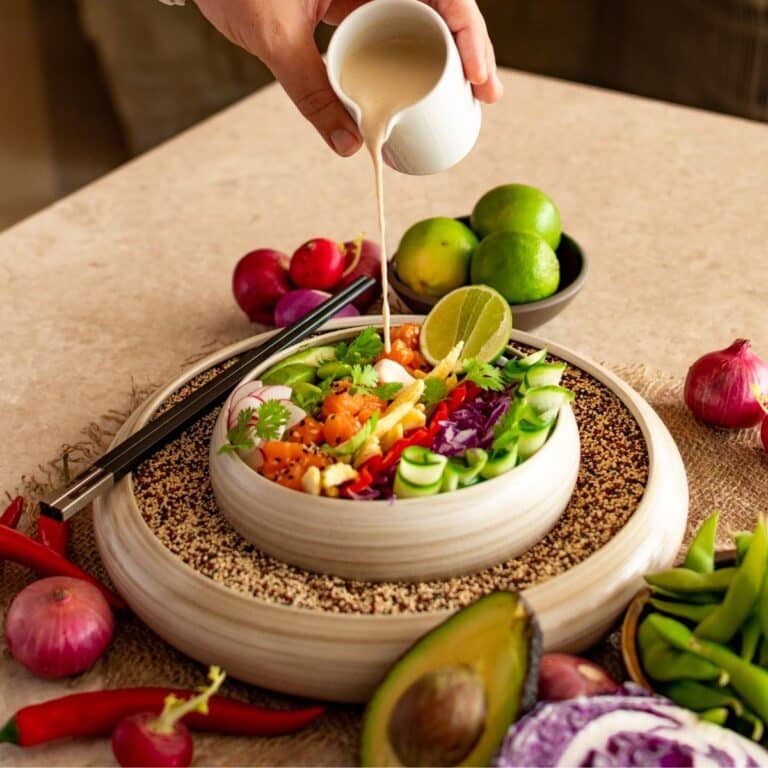
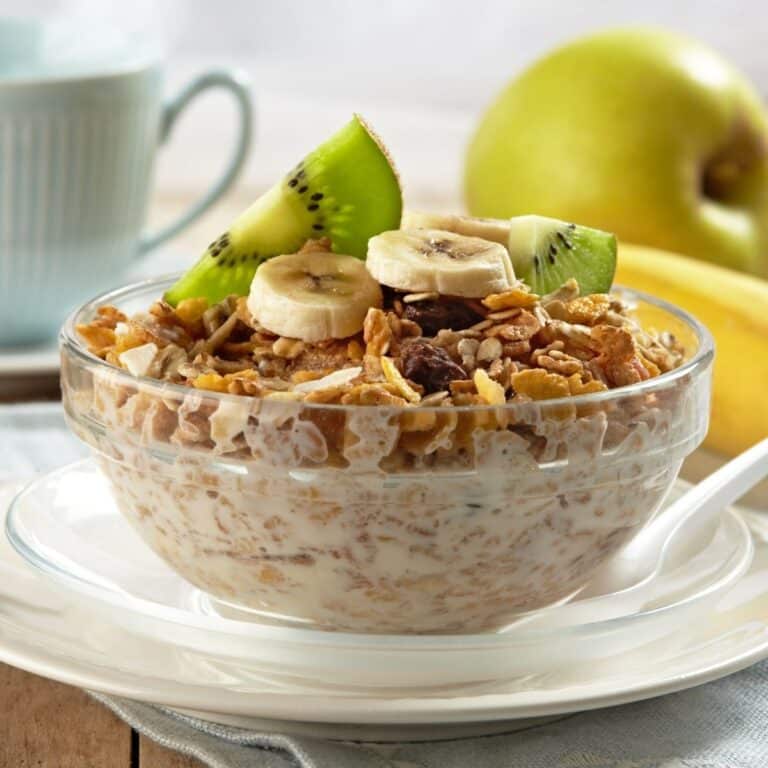



Great information on a widely used product! You cleared up questions I had about this!
thanks so much for this info. have been using half sugar/half splenda when baking. i'll try stevia. i've wondering about the safety of these products, but was very confused afted researching reports on the internet.
I tried stevia about 15 years ago. My aunt sent it from England. It was bitter with a hint of sweetness behind it. I haven’t tried the sweetener again since then, but I am willing to give it another try after reading your informative article. Thank you.
Thank you for such great information!
Stay warm! We are blessed in Arizona with great winters…and a reason why we live through the hot summers!
Thanks again!
I really appreciate this arrival about Stevia. This has been a big question I haven’t been able to get a reliable answer on until now. Thank you!